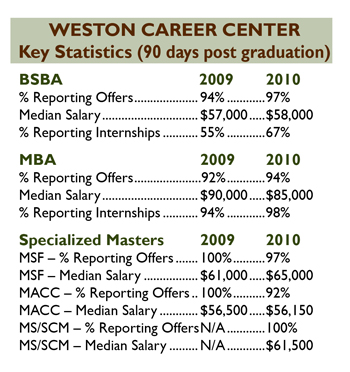What do elevator pitches, speed-dating and Skype have to do with getting a job? Just ask a student at top-ranked Olin Business School at Washington University in St. Louis.
Learning how to introduce yourself to a potential employer and making a good impression in two minutes via video conference or in person are just a few of the skills Olin undergrads and MBAs master in a new course offered in conjunction with the school’s career center.
“In my two minutes, my main goal is to show them I’m not your average student,” says Ashley Elleby, a first-year MBA student about talking to company recruiters at a job fair. “I have an atypical background, I’m an engineer, working in supply chain and operations. I need to give them enough information to interest them, intrigue them, and hope they will call me to set up an interview.”
A new course, “Olin Professional Development Program (Olin PRODEV)-Mastering the Art of Career Readiness,” is required of all first-year MBAs and begins during orientation before the semester starts. Undergrads receive similar training as part of a required management course.
“Recruiters come to campus just weeks after school starts, so our students need to be prepared to market themselves,” says Mark Brostoff, associate dean and director of the Weston Career Center at Olin.
In addition to resume writing, Olin students develop a two-minute “elevator pitch” as a way to introduce themselves to recruiters. They practice the pitch with Olin alumni at a speed-networking event that works like speed-dating with students moving from table to table, practicing handshakes and pitches with dozens of “recruiters.”
“These practice sessions are crucial,” Brostoff says. “Students need to polish their skill sets for career conferences and interviews to make the best impression. They have to learn how to work the room.”
From guest lectures on how to prepare for interviews in different industries to receptions and mock one-on-one interviews with lots of feedback, Olin’s career center advisers provide a variety of ways to prepare for the quick onslaught of recruitment.
The full-court press is paying off. Last year, Olin’s placement track record of its MBA graduates was second only to Yale, according to a Bloomberg Businessweek survey.
During a recent “Meet the Firms” event where students and recruiters mingled and networked, sophomore Jason Yakabu was trying out some new skills. “We practiced elevator pitches in class the other day, but today I’m perfecting it. Down the road, it’s really going to help me.”
Olin’s Weston Career Center initiated the PRODEV curriculum in the wake of the financial crisis to prepare students for changes in the job market and corporate recruiting practices.
“Recruiting has changed extensively at the graduate level,” Brostoff says. “Employers cut back their school visits and recruiting during the recession and they are not going to ramp up now. They found they can stay in their office and students will come to them.”
Olin organized “career treks” for MBA students to New York, San Jose and Chicago last year and will do the same this year. A newly renovated interview suite in the career center features private offices for phone and Skype calls with recruiters to respond to the increased demand for virtual interviews.
With the elimination of many jobs in the traditional MBA fields of finance and consulting, the depressed employment market also has required students to recalibrate their career expectations, Brostoff says.
“We’re encouraging our MBAs to seek non-traditional niche job markets such as start-ups and nonprofits,” he says. “These areas are growing while the traditional markets are making a slow come-back.”
Employment statistics for the class of 2010 and job offers for next year’s graduates are up significantly from 2009. Brostoff says these are welcome signs of a gradual improvement and recovery in the economy.
“I think if the internship market stays strong for two summers in a row post-recession, then I think we’ll see more full time offers coming back at the end of next summer.
“2012 might be the first post-recession MBA class to see a strengthening of the job market,” Brostoff says.